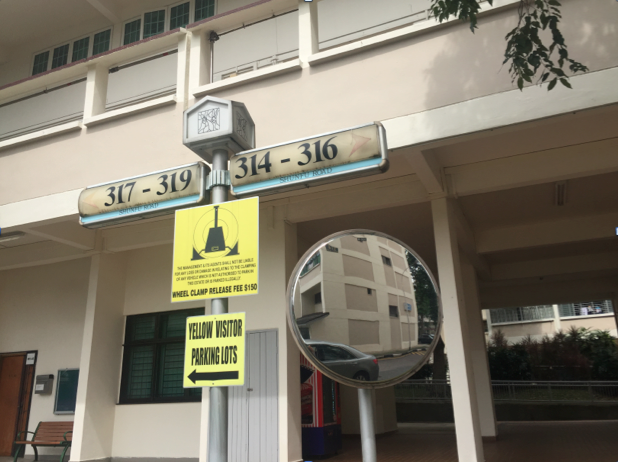When is Enbloc good or bad news? Receiving an enbloc offer for your property is akin to striking lottery. So who wouldn’t be pleased with it? Not everyone actually. Some may have an emotional attachment to their home or location as their family or relatives may have stayed in this development or in this vicinity, still many others dislike the hassle of moving or face difficulties in finding a similar home. Once Enbloc comes, familiar sights of spacious grounds, old trees with dense foliage will be gone, in comes the dreaded concrete boxes and pigeon holes. How did a French word En Bloc, meaning “in the block” or “in its entirety” become so famous? Why not “bao gao liao” in Hokkien? Maybe French more sexy. Nevermind, that is a topic for another day.
01 Oct 2017

Image Credits: Shunfu ville Enbloc blocks 314 to 319, Paul Ho, iCompareLoan.com
Despite your reluctance to sell, you were forced to sell because the majority voted to sell.
Well, it is not bad striking lottery, right? What is even better is someone forced this lottery on you. So is enbloc good or bad?
What if you thought your struck lottery and you ended up losing money?
Here is a hypothetical situation where you can lose money on your Condominium En bloc sale
Table of Contents
- You bought your property recently and it was En bloc against your will as the sales committee managed to obtain more than 80% of owners agreeing to sell (for developments older than 10 years). You got slapped with Seller Stamp Duty SSD as your sale is within the SSD period.
- You spent $100,000 renovating your dream home and you have to move house and your renovation goes down the drain.
- The developer that bought over or en bloc your property is completing the deal, 1 to 2 years down the road. You will not receive all the monies until 1 to 2 years later, upon completion.
- There is a chance that the deal may not complete as there are many conditions to the deal. In an aborted deal, there will be a whole host of costs, such as Legal and consulting and other incidental costs that will have to be paid by the home owners.
- You cannot afford to buy a replacement house while your funds are not in yet as the en bloc deal is not yet completed.
Bank’s bridging loan (for Mortgage loan) is generally only for traditional Selling and buying property with a funding gap of not more than 6 months, for En bloc, most banks may not want to get involved.
- During this time while you wait to move house, there is a potential that the property prices have started to move up. You will have sold your property for what you thought was a good price only to realize that any potential gains is gone as you end up buying a more expensive property in the open market.
Illustration: Here is how En bloc can lose you Money
- Bought a property (Completion) for $1m in 01 June 2017 to stay near parents.
- Renovation spent $100,000 01 July 2017
- The Enbloc deal for $1,300,000 is signed on 01 Sep 2017.
- Seller Stamp Duty (SSD) is payable around 15 Sep 2017. Seller stamp Duty (SSD) of 12% = $156,000.
- Date of actual completion of the deal is estimated to be 30 Aug 2018.
- Sales proceeds of balance of $1,300,000 for the property to be received around 30th Aug 2018.
While you wait for your Enbloc completion, another property that you were planning to buy at $1,000,000 rose to $1,100,000 in 30 Aug 2018. This means you have to pay an extra $100,000 due to this wait.
Transaction
En bloc Sale Price = $1,300,000
Bought Price = $1,000,000
Gross Profit = $ 300,000
Costs involved
Seller Stamp Duty @ 12% = $ 156,000
Renovation Cost = $ 100,000
Waiting cost to buy new Condo = $ 100,000
Other moving costs, time and effort = $ 20,000
Penalty on Home Loan 1.5% = $ 15,000
Loss interest on SSD @ 4% = $ 6,240
Total Costs = $ 397,240
LOSS = $ 97,240
As a result of En bloc your potential joy turned into nightmare. Instead of making $300,000 profit, you ended up losing $91,000 and ended up having to move house again. The lifestyle disruption is huge.
Enbloc could also kill your 1km Phase 1 primary school eligibility
What if you moved due to your child’s primary school entry requirement of 1km, this En Bloc would have killed your child’s chances of being within 1km from the school to be placed within the phase 1 registration.
You will have to fund your seller stamp duty (SSD) cost, as SSD is based on the En Bloc exercise date and not the completion date. And interest foregone is at the home owner’s cost.
This is considering if you eventually get the En bloc deal through. A famous case is where Horizon Tower where the En bloc is not approved. This not only cost the management money and hardship and any potential lawsuits will have to be funded by the residents.
Of course, if the deal does not go through, it is good news for those who rejected the sale.
Let’s look at the scenario faced by a blogger by the name of Nickleman, who raises the several issues faced with the enbloc at Shunfu Ville estate, though he did not lose money, it was nonetheless very unpleasant and disruptive.
With so many developers (including foreign ones) in the Singapore market place, they are sure to bid for more land to build. This means more expensive land prices, more expensive En Bloc, not only that, if you want to raise your plot ratio, you have to pay the government Development Charge (DC) which is essentially a License to have more Built-up space.
If your condo is 100,000 feet of land at 2:1 plot ratio, it means you can build 200,000 feet of space known as Gross floor area (GFA). If someone comes and buy your condo project and apply for a plot ratio of 4: 1. That means instead of building 200,000 feet, you can build 400,000 feet of space and sell them. Since you can build more and sell, then surely the home owners stand to benefit, right? Because the developer will bid higher for it.
Singapore’s IRAS loves to join your party
But wait… You have a party, how can you not invite the government? Our Singapore government is very participative, they will simply invite themselves to your party, they have this thing called Development charge (DC) where they want a share (and a huge one at that), from any potential gains of being able to build more. So the developers will have to give you less because they have to give much of it to the new fat guy/girl who joined the party uninvited and gobbled up half of your catered buffet food.
You can think of Development charge (DC) is a bit like COE.
- For Cars, it is COE (~$50,000) + Car Price ($20,000) + Car Tax ($30,000) + Dealer Margin ($10,000) = $120,000
- For Condominiums, it is DC (~$700 psf) + Building Cost (~$250 psf) + Misc (~$100 p.s.f.) + Developer Margin (~$100 to $200 p.s.f.) or around $1200 to $1300. So this is only for those extra p.s.f. you want to build in the sky.
It is simply a “license” granted to you to build it’s like creating money from thin air. I let you build more square feet in the air, but you pay me development charge (DC). This works out to $715 dollars per square feet for Sector 108 (Leedon Heights area) as at 01 Oct 2017.
Since incomes are hardly rising, condominiums and apartments will have to get smaller.
Surely we can blame the developers or we can call it the free-market economy. Surely we should never blame the land policy. Our land policies are never wrong, because it is an asset enhancement policy whereby your house gets more and more expensive. Whether enbloc is good or bad, it depends on the land policy we have. Because we own more expensive properties, we pay more and more property tax, incur more and more overall housing loan interest cost. We are asset rich, great. We can sell our properties for huge profits, but sell already stay where? Buy even more expensive properties?
Would you rather your property price did not appreciate and we all pay less property tax and other incidental costs?
To read up more on property buying in Singapore to know what is noise and what is real. Or click here for the Ultimate Guide on Property Buying in Singapore.





